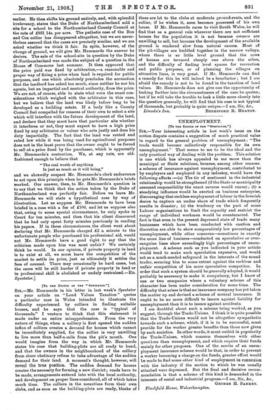[To THE EDITOR OF THE " SPROTATOR."1
SIR,—Mr. Hernmerde in his letter in last week's Spectator on your article on "Land Values Taxation" quotes a particular case in Wales intended to illustrate the difficulty experienced by colliers in finding suitable houses, and he says that the case is "typical of thousands." I venture to think that this statement is made under an entire misapprehension. From the very nature of things, when a colliery is first opened the sudden influx of colliers creates a demand for houses which cannot be immediately supplied, for the collier is very unwilling to live more than half-a-mile from the pit's mouth. One would imagine from the way in which Mr. Hemmerde states his case that building-plots are all ready to band, and that the owners in the neighbourhood of the colliery from sheer obstinacy refuse to take advantage of the sudden demand for their land. A moment's thought, however, will reveal the true position. The sudden demand for houses creates the necessity for forming a new district; roads have to be made, arrangements entered into with the local authority, and development on proper lines considered, all of which takes much time. The colliers in the meantime form their own clubs, and as soon as the building-plots are ready, blocks of
these are let to the clubs at moderate ground-rents, and the collier, if he wishes it, soon becomes possessed of his own house. If Mr. Hemmerde cares to visit South Wales, he will find that as a general rule wherever there . are not sufficient houses for the population it is not because owners are unwilling to sell, but because the development of the available ground is rendered slow from natural causes. Most of the pit-villages are huddled together in the narrow valleys, where there is so little level ground that the rows of houses are terraced steeply one above the other. and the difficulty of finding level spaces for recreation and public purposes, or of planning the villages on attractive lines, is very great. If Mr. Heinmerde can find a remedy for this he will indeed be a benefactor ; but I am afraid the remedy is not to be found in the taxation of loud values. Mr. Hemmerde does not give one the opportunity of looking further into the circumstances of the case he quotes; but if he will take the trouble to look a little more closely into the question generally, he will find that his case is not typical of thousands, but probably is quite unique.—I am, Sir, &c.,
































































 Previous page
Previous page